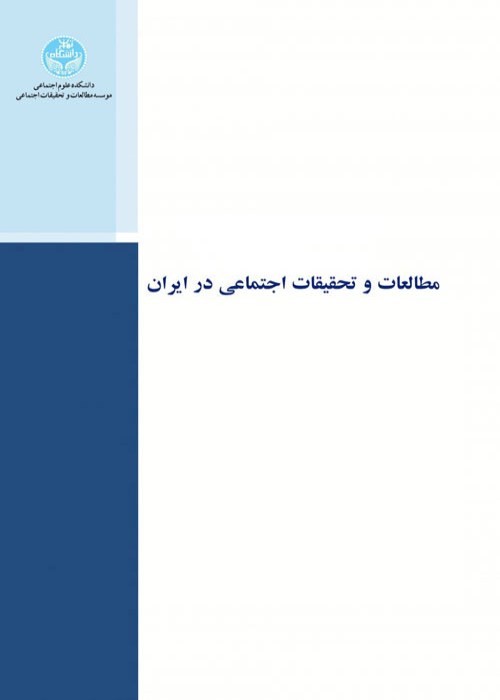A Sociological Construct of Interest: With an Emphasis on Bourdieu's Understanding of Interest
Author(s):
Article Type:
Research/Original Article (دارای رتبه معتبر)
Abstract:
Introduction
by saying the word of interest, the first thing that comes to mind immediately is economic interest and this is while different fields of life have their own interests which are not necessarily economic interests. Method
the present study uses the documentary method to investigate the diversity of levels and non-economic meanings of the concept of interest from the perspective of sociologists and intends to provide for researchers a conceptual tool for explaining social phenomena by emphasizing Bourdieu's understanding of interest. Results and discussion
This study shows that Alexis De Tocqueville, Marx Weber, Gustav Ratzenhofer, Albion Small, Edward Alsworth Ross, George Simmel And James Coleman have used profit in its micro and individual form. However, there is a difference between these thinkers regarding the concept of interest and that of Tocqueville, Weber, Coleman and Simmel. The later have considered the concept of interest as a social element and have used it in the analysis of relations between people in society. But Ratzenhofer, Small, And Ross have a pre-social understanding of the concept of interest, and see it as an element that shapes society, not a factor through which relationships between individuals in society can be analyzed. The study also suggests that thinkers such as karl Marx, Arthur Bentley, And Pierre Bourdieu used interest collectively. However, with a deeper look at the empirical application of the theories of the above thinkers in relation to the concept of interest, it may be said that Marx's sociological view of the concept of interest in the form of class interests, although has a sociological burden and does not consider interest specific to the individual. It considers the economic meaning of interest for a group of people of the same class and in a way closes the way for thinking and reflecting on other various and non-economic forms of interest. Bentley's view leads to the tautology by uniting the interest and the road group and for this reason; the possibility of experimental application and testability is limited. Conclusion
In his analysis, Bourdieu showed that the fields of academia, art, etc., have interests that are not necessarily economic interests and are governed by rules other than those of the world of economics. The process of segregation of social worlds, each of which has its own interests or spheres of power, requires that social researchers be equipped with a conceptual and theoretical tool to discover the interests, the relationships between field actors, and the internal rules of these social fields. This conceptual tool, in addition to being more in line with social reality, unlike the Marxist concept of benefit, is not limited to the economic and possibly political sense, and can also discover non-economic interests that govern human life and measure people's relationships with these types of non-economic benefits in addition to the above, the advantage of Bourdieu's understanding of interest over Bentley's understanding is that it is free from the flaws of tautology. And he does not equate the benefit with the field and states that the interest belongs to the field and not the field itself. It also has this advantage over micro-level theorists. In addition to the micro level (at the level of family and group friendship, etc.), it also has the ability to be applied at the macro and collective level. With these interpretations, the author believes that Bourdieu's sociological application of the concept of interest can be a practical tool for social science researchers to understand the social world.Language:
Persian
Published:
Quarterly of Social Studies and Research in Iran, Volume:9 Issue: 4, 2020
Pages:
1027 to 1052
magiran.com/p2209775
دانلود و مطالعه متن این مقاله با یکی از روشهای زیر امکان پذیر است:
اشتراک شخصی
با عضویت و پرداخت آنلاین حق اشتراک یکساله به مبلغ 1,390,000ريال میتوانید 70 عنوان مطلب دانلود کنید!
اشتراک سازمانی
به کتابخانه دانشگاه یا محل کار خود پیشنهاد کنید تا اشتراک سازمانی این پایگاه را برای دسترسی نامحدود همه کاربران به متن مطالب تهیه نمایند!
توجه!
- حق عضویت دریافتی صرف حمایت از نشریات عضو و نگهداری، تکمیل و توسعه مگیران میشود.
- پرداخت حق اشتراک و دانلود مقالات اجازه بازنشر آن در سایر رسانههای چاپی و دیجیتال را به کاربر نمیدهد.
In order to view content subscription is required
Personal subscription
Subscribe magiran.com for 70 € euros via PayPal and download 70 articles during a year.
Organization subscription
Please contact us to subscribe your university or library for unlimited access!


